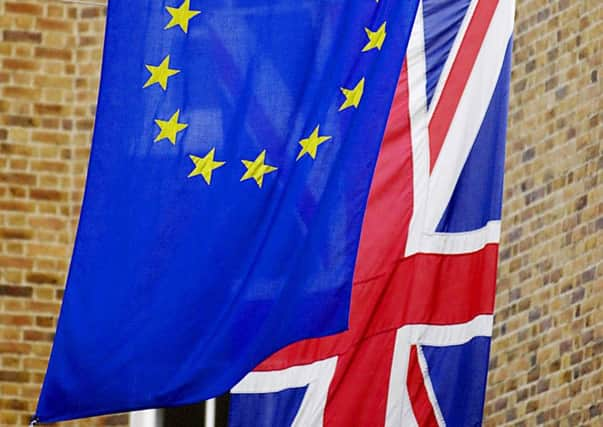Kenyon Wright: A plea to David Cameron on Europe


First, please expose and explode some of the myths which your Euro-sceptics repeat ad nauseam; and second, ensure that what you are asking for is actually possible.
Myth No 1: “The UK originally joined a purely economic union with no political aspect or goals, and we need to get back to that.”
Advertisement
Hide AdAdvertisement
Hide AdThis of course he knows to be untrue. The means were certainly economic, but the goal, the vision, the driving force, was always socio-political. The coal and steel community which gave birth to the EEC was obviously an economic arrangement, but its purpose was clear – to make it impossible for France and Germany to plunge Europe into the kind of war that had twice ruined the continent and beyond in the 20th century.
When the Treaty of Rome founded the EEC (to which we later adhered) the road to peace could be more fully defined. All member states were “determined to lay the foundation of an ever-closer Union among the peoples of Europe” Anyone who voted in the first referendum that took us into the European Community believing it was only about trade were simply mistaken.
Myth No 2: “Britain never signed up to ‘an ever-closer Union.”
Of course we did – both on accession and repeatedly in every Treaty thereafter. However, the key development which gave birth to the European Union and defined the commitment to “ever-closer union” came in the Single European Act (SEA) which was I believe the greatest change in the history of modern Europe
The SEA of 1986 is seldom mentioned now, but it is the most important joint statement, more important than the Treaties themselves, for it created the EU. It was signed, not by governments, but by the heads of state of the member countries, including Her Majesty the Queen, and declared a common commitment “to transform relations as a whole among their States into a European Union.”
It is surely one of the odd footnotes of history that the Single European Act with its emphasis on integration and wider powers, was actually steered through Parliament by Margaret Thatcher.
In 1992 the Maastricht Treaty gave shape to the decisions of the SEA, and restated the goal in a new way. The members “resolved to continue the process of creating an ever closer union among the peoples of Europe, in which decisions are taken as closely as possible to the citizen in accordance with the principle of subsidiarity”
This defines the true meaning of “ever closer union” and thus provides the basis for positive reform of the EU, and for Scotland’s potential role in a renewed Europe
Advertisement
Hide AdAdvertisement
Hide AdMyth No 3: “The EU is in danger of becoming ‘a federal superstate’.”
There is no such thing. The two words are mutually contradictory. A federal state is one in which power is shared between the centre and other levels. A superstate concentrates all power at a single level. By recognising different levels of constitutionally-defined secure power, a federal-type state sets limits to power and provides checks and balances. Within the EU, the most obvious candidate for the title of “superstate” is surely the UK.
But there is one way the UK government could prove me wrong, by acting not as a superstate but as “a family of nations”. It is simple. Make it clear that the UK will leave the EU only if all four nations vote to do so, and that no one nation, whatever the figures, can impose such a damaging possibility against the will of all four. I warn David Cameron – if you deny this, and if the vote were for Brexit, the call for a new referendum on independence would become irresistible in Scotland.
The Maastricht Treaty definition of the meaning of “ever closer union of peoples”, is “one in which decisions are taken as closely as possible to the citizen in accordance with the principle of subsidiarity”.
The need for the reform of the EU arises, not from too much integration, but from the failure to involve the peoples meaningfully in decision-making, and the failure to understand what subsidiarity means.
It is not about repatriation of powers, but about redefinition of powers. Power is held at different levels as appropriate, and at the lowest level at which it can be effectively exercised.
This seems to be a principle that the UK’s constitutional system is institutionally unable to comprehend. The one thing which sets the UK apart from all the others, is not just the absence of a written constitution, but the way in which the silent insidious influence of the unwritten constitution distorts all the UK’s dealings with other members.
All efforts seem to be on claims for Westminster, rather than redefining where power can most effectively be held, and how to involve the citizens more in decision-making.
Advertisement
Hide AdAdvertisement
Hide AdIf the Prime Minister’s commitment to Europe is real, he cannot expect to renounce “ever-closer union” which is at the very heart of the European vision. He could however recognise the development of a two-speed Europe, in which the Euro countries and others, see the goal as constitutional federalism, while the UK, probably alone, interprets “ever closer union” as some kind of semi-detachment.
I believe Europe could live with that – though I hope and believe Scotland would opt for the federal way, and will work to make “ever closer union of peoples and citizens” a reality.